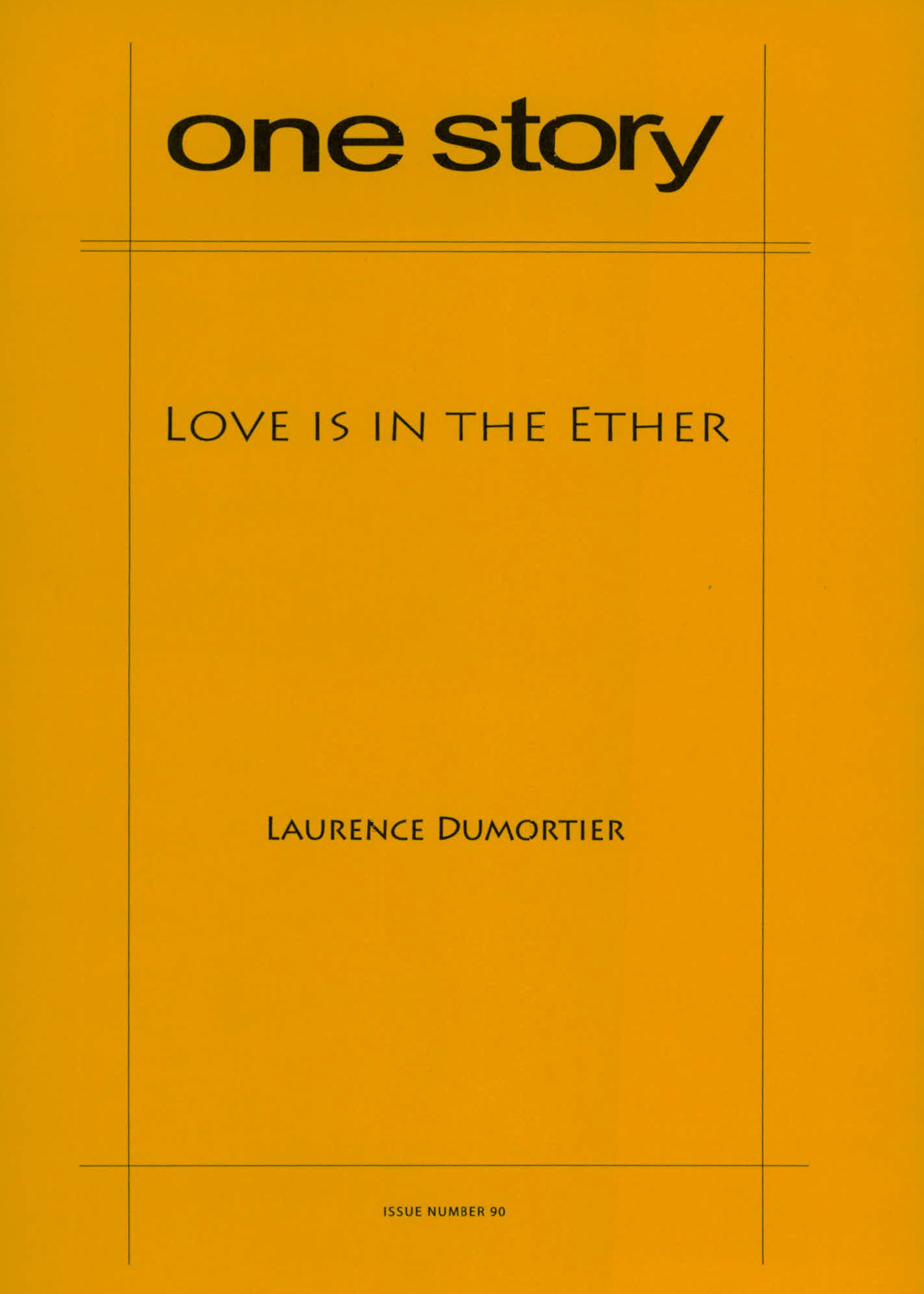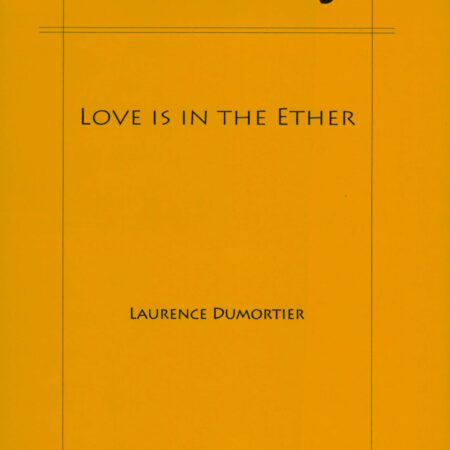
Love is in the Ether
$2.50
42 in stock
Excerpt
After your son dies, this is what you remember.
When he is tiny he is already beautiful, and not just like all babies are—people have to stop and admire him. They get a faraway look on their faces. They hardly glance up at you at all when they ask you questions—How old is he? What’s his name?—their eyes on him only. Everyone remarks on the sunny disposition that makes people want to laugh with him, but really he is wistful too in a way that is strange and heartbreaking for a baby. His sister, who just moments earlier, it seems, was herself the center of attention in your new family is now merely his sister. What a shock for her when he came along. And you become no longer yourself, Beatrice Worth Longfellow, a girl who graduated from Vassar near the top of her class, who wants someday to open an art gallery, but simply his mother.
Laurence Dumortier
Laurence Dumortier studied art history at Wellesley College and writing at Antioch University. She has taught kindergarten and first grade, and now teaches non-fiction to college students. She lives in Los Angeles with her husband and son.
Q&A by Hannah Tinti
- HT: Where did the idea for this story come from?
- LD: A few years ago an old boyfriend of mine died suddenly. He was the first person I’d known intimately who died while still young. The idea of memory seemed to me (and still seems) very important. I felt that he continued to exist while people remembered him. This isn’t a new idea, of course, but it had the freshness of revelation each time it occurred to me. At the same time it occurred to me that there were all these moments we’d lived through together that I was now the only one to know about. I wondered about the continued existence of these moments. If I forgot them, it was as though they hadn’t existed at all. That seemed to me strange and also very sad. I thought about the other people who’d known him, who must have this same experience, and particularly his family. I think that was the beginning of thinking about what it would be like to lose not just someone that you were very close to, but your child.
- HT: What was the most challenging aspect of writing this story?
- LD: Writing this story was different from anything else I’ve written in the sense that the first draft came really quickly, within a few days. Although the revising process was long, and it went through many revisions, each time relatively little things were tweaked. That’s radically different from the way it usually works for me, where the drafting process takes weeks or months, and the revisions are extensive. Still, figuring out what exactly needed to be tweaked to make it work when it wasn’t quite yet, was a challenge. Hannah, the editor of One Story, had some great suggestions and comments, and together we went back and forth to figure out what changes were needed to make it really work! I know some writers who get offended when editors make suggestions or request changes, but I see the piece of writing as being separate from me. I’m kind of like its guardian: I want it to do well, and I’m responsible for it, but it’s not the same thing as me. It has its own self which I’m just trying to shepherd into the world. If somebody else has a good idea to help it get there I’m all ears.
- HT: Why did you choose second person for the point of view?
- LD: I didn’t really choose it in a conscious sense, it just came that way. Later, when people I showed it to were moved by the story but questioned the use of second person, I experimented with putting it into first or third person. Neither of those really worked. It seemed to lose some of its immediacy and became a different story.
- HT: Beatrice is such a wonderful character. Was it difficult to find her voice in this story, or were you able to get into her thoughts right away?
- LD: She pretty much showed up fully formed. For me it always happens that way. Characters just show up, I can’t really will them into existence, much as I might try! I think for some writers there can be a conscious decision, Oh, I need a character like this, or like that. But for me, if I try to create a particular kind of character, it comes out forced and weird.
- HT: Throughout “Love is in the Ether,” Judy & Roger’s beach house is a place of healing. At the same time, Beatrice keeps returning, and it gives the story a great structure. It’s almost like a marker, as she goes through different phases of life. Did you start off meaning to use it this way? Or did it just develop on its own?
- LD: It developed that way on its own. I think certain places have emotional resonance for people, and for Beatrice her friends’ house is that kind of place. The first line of the novel Rebecca, “Last night I dreamt I went to Manderley again,” really captures for me the strong associations that we bring to place, the way that they exist as physical spaces as well as places in our memory and imagination.
- HT: Throughout the story, there is an emphasis on the physical aspects of loss. After her son’s death, Beatrice loses sense of her body—it no longer has a purpose. At the same time there are other physical moments that seem to help her recover—the kindergartener touching her shoe as she reads, her husband’s hand under the table, and then holding her granddaughter in the water. Do you think grieving is as much physical as mental? And how do you balance the internal and external struggle of your characters?
- LD: I do think grieving is physical as well as mental. One of the things that is painful about death is the absence of physical connection. I think that’s one of the things that makes divorce so painful too. You can’t touch each other anymore, though you used to connect in that way. If you can’t use your body then it becomes useless; it’s self-reinforcing. And so, yes, touch can be very healing. I think that’s why we’re so crazy for massages and spa treatments and that kind of thing. I was reading Sylvia Plath’s journals recently, and there’s an amazing moment when she describes sitting on her front step and two neighbor children putting flowers in her hair, and her feeling of being whole and new again.
- HT: There is a remarkable lightness in the last pages, as Beatrice lets go of her grief. It’s very difficult to pull off an ending that gives the reader such an emotional lift. Can you talk a bit about how you came to this particular ending? Was it planned from the start, or did you find it along the way?
- LD: I had the sense as I went along that there should be a new baby, a new generation, that Beatrice should go back to the beach house. Often, my writing sort of plunges into the dark but by the end there is some light.
- HT: Your background is in non-fiction writing. What is the biggest challenge, in your opinion, moving from non-fiction to fiction?
- LD: In some ways there are more similarities than differences. I’ve been teaching the personal essay to college students, and a lot of the things we talk about: scene, sense of place, back-story, are also the concerns of fiction writing. In fiction writing of course, you are not bound to the literal truth, and so that’s a tremendous freedom, but it’s also sort of scary to have so much possibility.
- HT: How long did it take you to complete this story?
- LD: The first draft was very quick, but the revising and editing process was years long. When I first started writing fiction I thought that a story that didn’t come together quickly was doomed, but I’ve learned to be more patient, and also more trusting in the process. I remember once reading an incredible story by Junot Diaz in the Best American series. In the little paragraph at the end of the book where the authors talk about their stories, he said that the story in question had been one that he couldn’t figure out how to get right—I think his words were “it always turned out ass”—but after years of periodically revising it, he figured out what it needed. That really inspired me to have faith in the story itself and also to commit to making stories as good as they possibly can be.
- HT: What is the best bit of advice about writing you have ever received?
- LD: I’ve gotten a lot of really great advice from teachers and friends, but the thing that came into my mind just now is something I read somewhere that Curtis Sittenfeld said. It came from one of her mentors who would say, pointing to a great passage in a piece of her writing, that if any part could be that good, then the whole thing could be that good. I think that’s what you want to strive for. It’s important also to trust in what you think is worth writing about. I remember reading a capsule review of an Alice Munro book that said something like “stories about middle-aged women,” which made me laugh. That one-sentence description sounds so dreary, but because it’s what she cares about, and she infuses the subject with her intelligence, humor, and artistry, the stories are beautiful and luminous. I think another important thing is to have readers you trust. If you can show your work to people whose opinions you respect and who also understand what you’re trying to do, then their feedback is both affirming and meaningful. Otherwise, especially as a beginning writer, you can be sent on some wild goose chases by well-meaning teachers or peers, who may have good ideas but don’t really get what you are trying to do.
- HT: What are you working on now?
- LD: I’m working on a novel. It’s about a woman struggling to come to terms with what happened to her and her college friends, ten years after they were students. It’s set in a women’s college, which I think is a strange and fascinating environment, and one that I know from my own college experience. There are so few men there except for professors and so, in the novel, that leads to some complications that the narrator is still trying to make peace with. The story is not autobiographical but it does draw on my experience of college as a very charged and complicated place.
